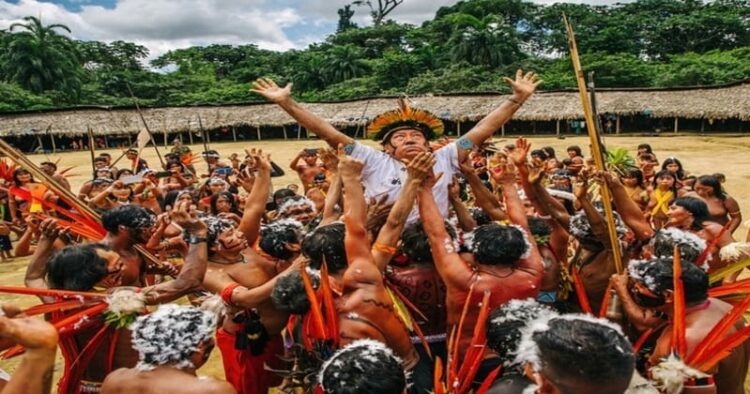As per the reports, there are 370 to 470 million tribes around the world spread over 80 countries. They are almost 5 to 6 per cent of the world’s population. Different countries name them differently, like Aborigines, Indigenous people, Indians, Adivasis, Indigenous cultural communities, native peoples, ethnic communities and tribes. These communities are having a very special culture, traditions and customs.
Most of the communities are nature worshipers, and their livelihood is dependent on nature. As per India’s stand in the UN, all the people in the country before 1947 are known indigenous. So, the common communities being discussed here are, in the Indian context, referred to as “Tribes”.
The G20 countries are home to 70-75 per cent of the total tribal population of the world. The remaining 25 per cent is spread in other 50 to 60 countries. Seventy-five per cent of the international trade and 85 per cent of the world GDP is from these G20 countries. It is the group of the world’s most powerful developed and emerging countries in terms of democracy, economy and military power. These indigenous cultural communities are the micro minorities that are cumulative 4-5 per cent of the total population of the G20. 30 per cent are living in extremely poor circumstances.
These tribal communities are facing various challenges in the world, especially more in developed counties than the poor ones. The primary challenges are their identity and existence. These challenges are due to urbanisation, industrialisation, climate change, posterisation and various political reasons.
The second challenge is the theft of their traditional knowledge and folklore by the emergence of Artificial Intelligence. As per reports very recently, When US tech firm Open AI rolled out Whisper, a speech recognition tool offering audio transcription and translation into English for dozens of languages, including Māori (the Language of New Zealand Tribes), it rang alarm bells for many Indigenous New Zealanders.
Indigenous tech and culture experts say that while such technologies can help preserve and revive their languages, harvesting their data without consent risks abuse, distorting of Indigenous culture, and depriving minorities of their rights.
Many countries recognised these communities and provided proper representation and priorities through their constitution and legal system. Few countries have not recognised these ethnic communities fully. India got a beautiful model for protecting these communities: a multi-layered protection system. There are more than 750 tribal communities in schedule, and based on the vulnerability due to increasing population and backwardness, around 75 tribes have been categorised as Primitive Vulnerable Tribal Groups (PVTGs), further in certain tribal areas, outsiders can enter only with special approvals from authorities (Jarawa tribes’ habitat at Andaman Island). There are even the untouched and unexplored tribes of South Sentinel Island of Andaman Island. It is home to the Sentinelese, a vulnerable tribe’s people in voluntary isolation who have defended, often by force, their protected isolation from the outside world. Entry into the Sentinelese Island by outsiders is strictly prohibited and treated as an offence.
The Indian constitution provides various degrees of protection. There is also a special act to protect Scheduled tribes from atrocities. Irrespective of all these protective measures, the tribal communities in India are facing challenges to their existence and identity.
Tribes in the US, Cannada, Brazil and Australia also get protective measures for their home tribes’ culture, land and traditions. But the above-mentioned challenges are faced by them as well.
In the Indonesian hosting of G20 in the previous turn, the W20 forums were alleged of exclusion of indigenous Indonesians from the discussions and dialogues. The W20, which stands for Women 20, is the G20’s official dialogue for women’s empowerment and one of several engagement groups under the umbrella of the economic forum. W20’s narrative was ironic when their theme was ‘recover together’ equally, but they didn’t even include any agenda related to the challenges of the women of Lake Toba, especially regarding land grabbing and customary forests. Toba women were not involved in the talks in an inclusive manner. Toba women are dying trying to defend their customary land, something which is apparently not considered a problem for the W20.
Now India is hosting the G20 Summit, the highest office of India is held by a tribal woman. India is home to a large number of tribal communities, including the world’s smallest tribal communities and the world’s unexplored tribal communities.
This is the right time for us to redeem the grievance of the G20 Summit of Indonesia with a declaration in the Summit on the commitment to the protection of Tribes/ Aborigines culture, traditions and customs.
Moreover, the risk due to the rise of AI demands thorough documentation of tribal traditional knowledge and folklore, with proper IP protection.



















Comments